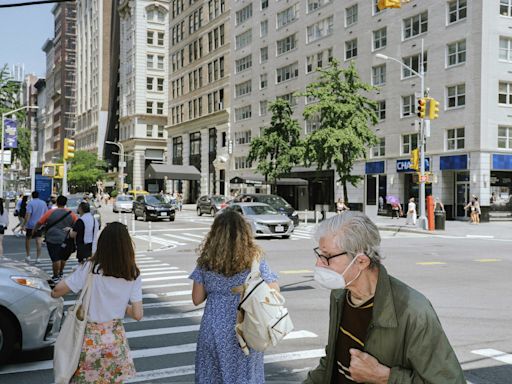Search results
- TODAY via Yahoo
2 new COVID variants called 'FLiRT' are spreading in the U.S. What are the symptoms?
The new "FLiRT" COVID-19 variants, including KP.2, are spreading in the United States. Will there be a summer surge? Experts discuss KP.2 transmission, symptoms, and vaccines.
3 days ago
- Yahoo Life
What to know about the new 'FLiRT' COVID variants that are spreading: Your guide to the latest virus news
Here’s your go-to guide with everything you need to know about COVID-19, including the latest "FLiRT"variants and concerns that they made evade immunity.
16 hours ago
Feb 7, 2024 · How long does immunity from a COVID-19 infection last? The immune response from a COVID-19 infection usually tamps down after 3-4 months, says Kawsar Talaat, MD, a vaccinologist and associate professor in the Department of International Health at the Johns Hopkins Bloomberg School of Public Health and the Johns Hopkins School of Medicine in ...
Nov 29, 2022 · Early in the pandemic, experts believed that antibodies and natural immunity to COVID-19 lasted for up to 3 months before diminishing. Later evidence suggested that natural immunity could...
Oct 26, 2023 · Research shows that the antibodies that develop from COVID-19 remain in the body for at least 8 months. Getty Images. Immunity can occur naturally after developing COVID-19, from getting...
Jan 26, 2021 · As seen in previous studies, the number of antibodies ranged widely between individuals. But, promisingly, their levels remained fairly stable over time, declining only modestly at 6 to 8 months after infection. Virus-specific B cells increased over time. People had more memory B cells six months after symptom onset than at one month afterwards.
Jan 23, 2024 · A 2021 study found 98% of people had antibodies against SARS-CoV-2’s spike protein (a protein on the surface of the virus that allows it to attach to our cells) one month after symptom onset....
The number and type of antibodies varied between people. But the levels usually remained stable over time. They slightly decreased six to eight months after infection. Immune cell levels also remained high. Memory B cells, which make antibodies, increased for a few months after infection and then remained stable.
Dec 20, 2022 · After infection with the COVID-19 virus or a COVID-19 vaccine, your body can take 2 to 3 weeks to make enough antibodies to be found in an antibody test. So it's important that you're not tested too soon.


